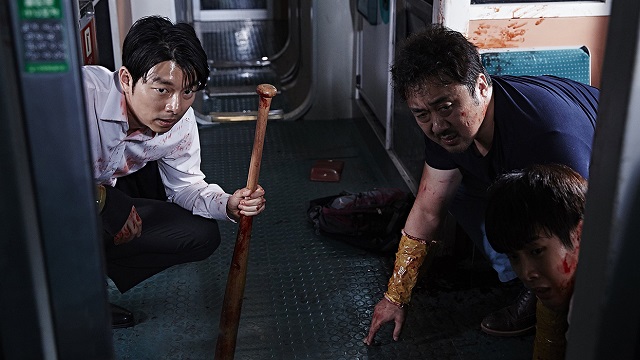OK, guys. Let’s face it. The zombie genre is exhausted. We’ve had zombie strippers, zombie pets, zombie beavers, teen perverts dealing with zombies, teen zombies in love, numerous zombie apocalypses, the rules about a zombie apocalypse, and whatever the heck The Walking Dead is now. We need a break. Zombies are done. Wiped out. Kaput. Yet, no matter how dead it may be, it keeps coming back. In a zombie hoard, there’s always that one zombie you can fixate on who is doing that little something extra. Train to Busan is that zombie.
Now, I’m not saying Train to Busan is anything wholly original. It takes the fast moving zombie hoards from World War Z and strips down the plot to an apocalyptic road movie. So many elements of this movie feel familiar to any fan of either the zombie genre or the apocalypse genre (not to mention the zombie apocalypse genre). But, Yeon Sang-Ho manages to inject so much energy into the mostly impeccable execution that the familiar plot feels fresh and engaging again.
Seok-Woo (Gong Yoo) is an overworked businessman who has custody of his daughter, but delegates all of the child rearing to his mother. For his daughter’s birthday, she makes the request to see her mother in Busan, requesting that Seok-Woo accompany her. Wouldn’t you know it, just before they get on the train, a zombie plague has broken out from some chemical plant or other. As they’re on the train, all of Korea falls into a zombie apocalypse, and the train passengers semi-blindly believe in a safe haven destination further down the road.
Sure, the train itself is filled with a motley crew of stock figures: two elderly sisters, a cruel selfish businessman, a high school baseball team with a couple of girls, a homeless dude, a very pregnant couple, and a bunch of nameless zombie food. Oh, and a zombie. Periodically their train is forced to make a stop, and the uninfected passengers face a new challenge.
Though we’ve all seen these elements before, Train to Busan puts the elements together in a particularly skilled way. Especially in the first act or two where all the possible paths are open, the expected scenes where the passengers split into groups and take sides to figure out where to stop and what to do next become fresh with solid direction and smart choices. By having a team of baseball players where each feels like a specific character, suddenly the audience cares about which player is turned and when.
As the movie winds to an expected finale, the freshness turns into complete and utter cheese. It’s a shame, really. What had been a movie that moved in interesting directions devolves into cliches and heart-string tugging that feels cheap and forced compared to the movie that preceded. The overall effect of Train to Busan is a reset on the zombie movie. It’s a return to genre simplicity without the irony or cultural commentary that have taken over the genre in the past decade. In a way, its that straightforward honesty that feels new again.


